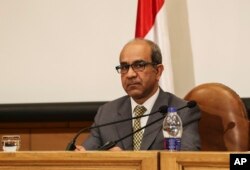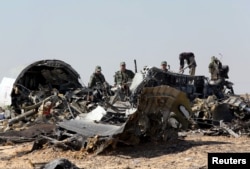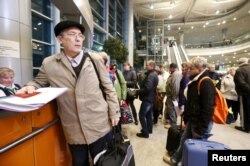Despite increasing indications that a bomb destroyed a Russian passenger airliner last week high over the Sinai Peninsula, the head of Egypt's investigation team says no definite conclusions have been reached.
An unexplained noise during the final second of audio recordings from the cockpit of the doomed jet has aroused intense attention, but Egypt's chief investigator, Ayman al-Muqaddam, said his team has not been able to determine whether it signaled an explosion or something else.
Muqaddam said all data from the Airbus jet, flying from Sharm el-Sheikh on the Red Sea coast to St. Petersburg, Russia, ended 23 minutes and 14 seconds after takeoff, while the plane's autopilot mechanism was engaged.
Debris field
Debris was scattered over a 13-kilometer-wide area on the ground, he added, confirming that the aircraft shattered into pieces at high altitude.
"A spectral analysis will be carried out by specialized labs in order to identify the nature of this noise," Muqaddam said.
All 224 people aboard the jet, a charter flight operated by the Russian company Metrojet, died last Saturday. Almost all of the passengers were Russian tourists returning home from seacoast holidays.
The audio recording investigators studied came from one of the Airbus plane's flight recorders, Muqaddam said.
In addition, authorities have been reviewing video recordings from the Sharm el-Sheikh airport, looking for any suspicious activity around the time of the plane's departure.
Terrorist 'chatter'
Foreign intelligence reports first raised the theory that a bomb exploded aboard the jet, based on overheard "chatter" by known terrorists shortly after the crash, and subsequent reports originating with U.S. intelligence said "heat flashes" in the area and at the time the plane broke apart were detected by satellites orbiting the Earth.
U.S. President Barack Obama and British Prime Minister David Cameron both have said a terrorist bomb plot was a likely possibility, but Russia and Egypt authorities have until now rejected those theories.
The Islamic State group, which has in the past vowed to retaliate against Russia and the United States for the airstrikes aimed at militants operating in Syria and Iraq, said it was responsible for blowing up the plane, but offered no specific details to corroborate that claim.
Egyptian President Abdel Fattah el-Sissi dismissed the IS claim as boastful propaganda aimed at damaging Egypt's security and its tourist industry, which is vital to the economy.
Rocket reported
Britain revealed Saturday that a plane carrying British tourists to Sharm el-Sheikh came within 300 meters of an airborne rocket on August 23, 2015.
The British government said it had concluded that the incident was not an attack, and that it likely was connected "to routine exercises being conducted by the Egyptian military" in the area.
In another development Saturday, Egyptian Foreign Minister Sameh Shoukry complained that the U.S., Britain and other countries did not share with Egypt intelligence they gathered about the Metrojet disaster, as Cairo had expected, and that nothing indicating a possible bomb blast had "until now" provided to Egyptian security services.
Russian President Vladimir Putin has called the bomb theory nothing but speculation. However, Putin suspended all Russian commercial flights to Egypt Friday, "until we have determined the true reasons" for the crash.
Putin also ordered his government to work out details of how to bring home thousands of Russian travelers now in Egypt.
Deputy Prime Minister Arkady Dvorkovich said Saturday that up to 80,000 Russian vacationers are stranded in Egypt, twice as many as had been estimated previously. On Sunday, a Russian official said about 11,000 have now returned home.
Russia also says it is sending three teams of inspectors to Egypt to examine security procedures at the country's airports.
Along with Russia, Britain and other European airlines have suspended flights to the resort and have urged travelers to be extra vigilant during all trips to Egypt, and the United States is tightening security procedures at a number of airports abroad for flights to U.S. destinations.
WATCH: Related video report by VOA's Carolyn Presutti







